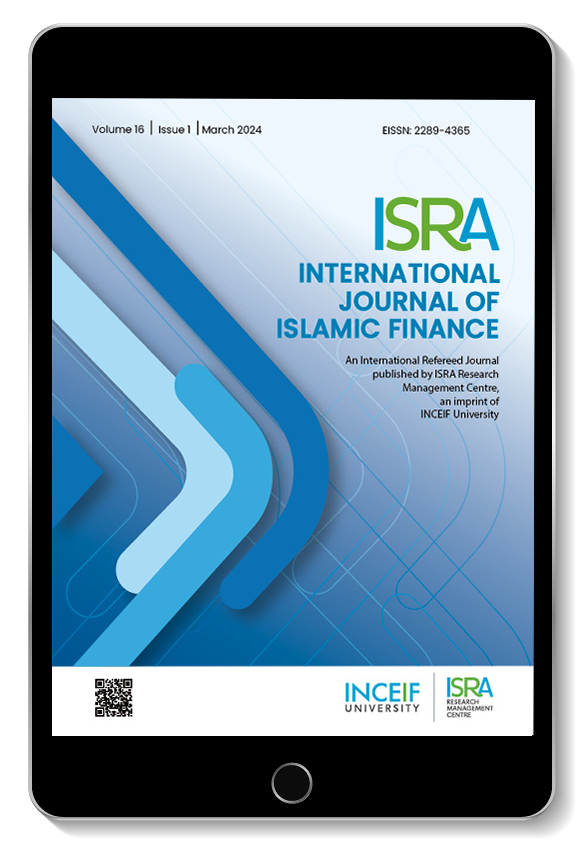Micro-takāful scheme for the protection of houses belonging to low-income groups in Malaysia
IF 2.8
Q2 BUSINESS, FINANCE
引用次数: 1
Abstract
PurposeThis study aims to assess the availability of micro-takaful (micro-Islamic insurance) schemes for the protection of houses belonging to low-income groups in Malaysia.Design/methodology/approachThe study is conducted via desk research and interview discussions with representatives from takaful operators and key stakeholders.FindingsFindings of the study confirm the importance of micro-takaful as a scheme for the protection of low-income groups. Micro-takaful schemes in Malaysia are, however, skewed towards the protection of health, life and family. The study finds little industry interest in the provision of micro-takaful schemes for the protection of houses for low-income groups. This represents another important area that takaful operators should take into consideration in their planning.Research limitations/implicationsThe paper will help the Majlis Agama Islam Negeri-Negeri (MAINs), the regulator, takaful operators and government agencies such as Jabatan Wakaf, Zakat dan Haji (JAWHAR) to generate awareness and promote the offering of micro-takaful schemes for the protection of houses belonging to low-income groups in Malaysia.Practical implicationsIn light of the limited availability of micro-takaful schemes for the protection of houses for low-income groups, this study argues that takaful operators should offer and promote them.Social implicationsThe study is significant for fulfilling the need of low-income groups in Malaysia to protect their houses in the event of catastrophes so that they will not suffer significant losses. Rather, micro-takaful will assist them in improving their standard of living.Originality/valueThis study promotes the idea that it is essential to facilitate the low-income groups with appropriate coverage made available to them; micro-takaful schemes in protecting their houses and home contents, should any defined calamities occur. The outcomes are necessary for further development of micro-takaful models, specifically for the protection of properties. The developed model shall be proposed for application in the Malaysian takaful and housing industry to facilitate low-income groups to obtain protection for their household and home contents.马来西亚保护低收入群体住房的微型takāful计划
目的本研究旨在评估微型伊斯兰保险(微型伊斯兰保险)计划的可用性,以保护属于马来西亚低收入群体的房屋。设计/方法/方法本研究是通过案头调查和与复试运营商和主要利益相关者代表的访谈讨论进行的。研究结果证实了微税作为一项保护低收入群体的计划的重要性。然而,马来西亚的小额养老保险计划倾向于保护健康、生命和家庭。这项研究发现,工业界对为低收入群体提供保护住房的小额补贴计划兴趣不大。这是另一个重要的领域,回教经营者应考虑在他们的规划。研究局限性/意义本文将帮助Majlis Agama Islam Negeri-Negeri (mas)、监管机构、回教保险运营商和政府机构(如Jabatan Wakaf、Zakat dan Haji (JAWHAR))提高认识并促进提供微型回教保险计划,以保护属于马来西亚低收入群体的房屋。鉴于为低收入群体提供住房保护的小额回教计划的可用性有限,本研究认为,回教计划经营者应提供并推广这些计划。社会意义该研究对于满足马来西亚低收入群体在灾难发生时保护房屋的需求具有重要意义,这样他们就不会遭受重大损失。相反,小额贷款将帮助他们提高生活水平。独创性/价值本研究提倡这样一种观点,即必须为低收入群体提供适当的服务;微型保险计划,以保护他们的房子和家里的东西,如果任何确定的灾难发生。这些结果对于进一步开发微保护模型,特别是对财产的保护是必要的。建议将所开发的模型应用于马来西亚的房地产和住房行业,以帮助低收入群体获得对其家庭和家庭内容的保护。
本文章由计算机程序翻译,如有差异,请以英文原文为准。
求助全文
约1分钟内获得全文
求助全文
来源期刊

ISRA International Journal of Islamic Finance
BUSINESS, FINANCE-
CiteScore
3.40
自引率
17.40%
发文量
18
审稿时长
20 weeks
期刊介绍:
It is the aspiration of the editorial committee that IJIF achieves the highest rank in quality and substance. It is thus our aim that the journal be carried in the Thompson Reuters’ ISI and Scopus databases. By ensuring high standards in articles published in Islamic finance we ensure that further innovation and research is carried out and promoted in the Islamic finance industry and academia. IJIF publishes 2 issues per annum.
 求助内容:
求助内容: 应助结果提醒方式:
应助结果提醒方式:


